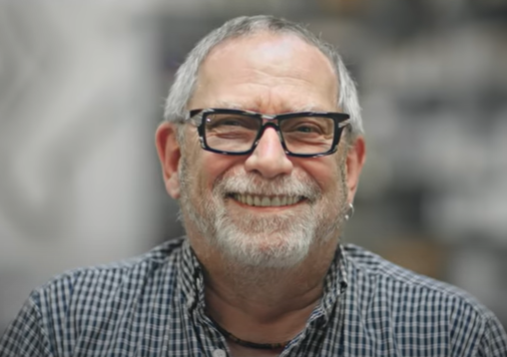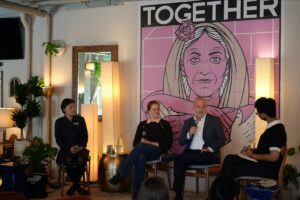“It can change people’s lives if we can get them housed and stable, or keep them from getting evicted. Then it’s not such a futile effort.” Lee Harrington, Director of Client Services, Emergency Financial Assistance, PRC

It’s been more than 40 years since the beginning of the AIDS pandemic that swept through the gay community. AIDS Emergency Fund (AEF) was founded in 1982 out of the community’s deep desire to do something to help their friends, partners, and family through these scary and uncertain times. They did this by providing emergency financial support. Only a few years later in 1987, AIDS Benefits Counselors, which would later become PRC, was founded to help those affected by HIV navigate their way through securing disability benefits. After merging with PRC in 2016, AIDS Emergency Fund was renamed Emergency Financial Assistance (EFA) but the program’s goal remains the same: helping individuals living with HIV/AIDS to overcome economic and housing barriers to medical care.
Lee Harrington is Emergency Financial Assistance (EFA)’s Director of Client Services, and has been on the front lines of the HIV pandemic since the beginning, and with EFA and AIDS Emergency Fund (AEF) before that since 1997: a remarkable 24 years. He’s helped tens of thousands find their footing and build more stable lives, and at the end of December, he will retire and hand the reigns over to a new era of compassionate life changers.
We recently sat down with him to give you an inside look into what EFA’s services mean to our clients.
Lee moved to San Francisco in 1973. In the late 1990’s he was a popular DJ in the Castro nightclub, the Castro Station, providing locals a place of escape at a time when HIV/AIDS was heavily affecting the community. Having seen ads for AIDS Emergency Fund around town, and having two roommates who’d been helped by the program, Lee decided to devote his free time during the day and started volunteering. After three months, AEF offered him a part-time job. When the Castro Station closed in 1999, Lee’s position became full-time, and he’s been with the organization ever since.
What is EFA? Can you break it down for someone who is unfamiliar?
“EFA is short-term emergency financial assistance. As the initials would indicate, short term isn’t quite as obvious. A lot of people come back year after year as things continue to get more expensive and they fall farther and farther behind. The goal is to help them get stabilized, and when they do, those funds can go to help somebody else. We have a lot of repeat clients because they’re living on the edge, or homeless, many times in combination with issues of mental illness and substance abuse disorders.”
Can you tell us about the progression of the work being done at AEF and PRC during your tenure?
“Emergency assistance started off as a grassroots, kind of a neighborhood thing. People sat around kitchen tables while our friends were getting sick with what was then an unknown disease, and they started taking up collections. As more friends became sick, they took up more collections. They approached local businesses with penny jars for people to throw in their loose change. Eventually, both the pandemic and the organization got really big, so we incorporated into a nonprofit and started to receive funds from the federal government through the Department of Public Health (DPH). Eventually, our budget grew to $1 Million, but the need continued to grow and grow.”
What is the main focus of EFA today?
“Our focus is assisting our HIV clients with short-term financial needs to help them get stabilized. We have a basic grant of $500 per year for qualifying clients that can be used to help pay for things like housing, utilities, and medical bills, and an additional $1,000 that we can combine with that to help prevent an eviction or to help pay a deposit if somebody finds affordable stable housing to move into. We can also use that $1,000 for medical expenses like dental work, eyeglasses, and hearing aids: things that people can’t really afford on their own. These days we’re doing a lot of work to keep people housed, to keep the lights turned on, or their refrigerator working, things like that. We also help clients get cell phones, which have become undeniably important. There just isn’t enough out there as far as long-term solutions. One thing I get excited about, however, is when clients are able to transition into PRC’s other services. Our residential behavioral health program for example does an exceptional job stabilizing people with mental illness or substance use issues.”
Do you find that this helps clients to get to somewhere more stable?
“Yes, in combination with PRC’s other services: workforce development, computer training, and job placement. They all play important roles. Our workforce development program has an amazing record when it comes to helping clients find various kinds of work.”
What does a success story look like?
“When a client has been struggling for years, and we help them get just far enough ahead to gain momentum, or they find housing, or we help them get housed. For a client with really expensive dental issues, if we can get teeth in their mouth so that they can eat. It’s the little things. When we don’t hear from them again, it’s usually a good sign that things are going well. It’s not that we don’t want to hear from them, but in this context, it’s incredibly gratifying to not hear from somebody. It feels like we’ve done something really useful and valuable.”
How many clients do you serve on a yearly basis?
“We serve between 1,500 and 1,600 clients annually. I typically see between 7 and 15 clients each day.”
How many people are in your department?
“There are currently two of us: there’s me and another manager who assists with client intake. Before the pandemic, we had a cadre of volunteers that helped with intakes, bill paying, and so on. It would be great to have them back but with COVID-19, we’ve been hesitant to start the volunteer program up again.”
Who is eligible for EFA?
“Anyone who lives in San Francisco and is HIV+. Income limits may apply, depending on circumstances.
How can people apply?
“Individuals can apply in-person at our office during set hours Monday through Friday. They can also apply through one of our community partners. We ask to see some documentation: I.D., proof of residence, and proof of income, which, either you prove that you have income and how much, or you declare that you don’t have any income at all. For the proof of residence, if they are homeless, they can fill out an affidavit of intention to live in San Francisco or they can have a case manager attest to their situation. And then if they want help with rent, we need a copy of a lease or a rental agreement. If they want a bill paid, they need to provide me with a copy of the bill.”
How long does it take for clients to receive financial assistance?
“These days it’s pretty much instantaneous. We issue checks once a week. We used to write them twice a week. We’ll get back to that eventually.”
Has this work impacted your volunteers?
“I’ve had volunteers that have gone on to social work, and some have even earned their master’s degrees and become licensed clinical social workers and the like. It’s wonderful to know that they’re inspired by the work done here. It makes you feel good, and it’s an indicator that this work is important and needs to be done.”
If PRC wasn’t here, what would it be like, for some of these clients?
“Imagine if you lived on $900 a month and could barely maintain a room in a hotel with a shared bathroom down the hall, one that’s always filthy. Many of the SRO’s in town are like this. Many of them don’t have kitchen facilities either, so you’re limited to microwave meals, or you have to eat out all the time, mostly relying on food banks, free food in the park, or wherever the free meals are. We strive to stabilize the lives of our clients so that this isn’t the case for them. Imagine trying to get by without a telephone. We provide one mobile phone, per client, per year. We pay phone bills for any carrier, and we provide phones that won’t restrict content. Something so simple can be a lifeline for our clients to rely on for many of their needs.”
So you’re retiring. How excited are you?
“I’m very excited and looking forward to being able to go to a museum, or to a movie, or a farmers market, or even just shopping; simple things that I typically haven’t been able to do during the day. I have a few writing projects that I will be able to focus on, and at some point, I’d love to get out of the country and do some traveling. My bucket list includes Croatia, Spain, Vienna, Raycevick, and even Paris.”
From all of us here at PRC, we wish Lee the best and have no doubt that he will enjoy all that’s yet to come to the fullest. He’s set the bar high and has been instrumental in building a program that has improved the lives of many, and in astounding ways. We’re committed to providing the same compassionate level of care his clients are accustomed to.
If you’ve enjoyed reading about Lee and the instrumental work he and EFA have done for our clients over the years, please consider making a donation today.
If you would like to learn more about the work being done at PRC, we invite you to read more client and staff stories on our blog.



